I have a Vector2D struct that I am using to hold a 2D array of Tile objects and Chunk objects:
template<typename T>
struct Vector2D
{
Vector2D() = delete;
Vector2D(U32 sizeX, U32 sizeY) : _size1{ sizeX }, _size2{ sizeY }
{
_array = new T * [_size1];
for (U32 i = 0; i < _size1; i++)
{
_array[i] = new T[_size2];
}
}
~Vector2D()
{
for (U32 i = 0; i < _size1; i++)
{
delete[] _array[i];
}
delete[] _array;
}
T& operator[](const Vector2& v) { assert(v.x < _size1&& v.y < _size2 && "vector out of bounds"); return _array[(U32)v.x][(U32)v.y]; }
const T& operator[](const Vector2& v) const { assert(v.x < _size1&& v.y < _size2 && "vector out of bounds"); return _array[(U32)v.x][(U32)v.y]; }
T*& operator[](const U32& i) { assert(i < _size1 && "index out of bounds"); return _array[i]; }
const T*& operator[](const U32& i) const { assert(i < _size1 && "index out of bounds"); return _array[i]; }
U32& sizeX() { return _size1; }
U32& sizeY() { return _size2; }
U64& size() { return (U64)_size1 * _size2; }
private:
T** _array;
U32 _size1;
U32 _size2;
};
since it has to default constructor, I have to construct it an a member initialization list here:
World::World(I32 seed, WorldSize size) : _seed{ seed }, _size{size},
CHUNKS_X{ (U16)(_size / CHUNK_SIZE) }, CHUNKS_Y{ (U16)(CHUNKS_X / WORLD_RATIO) },
_tiles(_size, _size / WORLD_RATIO), _chunks(CHUNKS_X, CHUNKS_Y)
{
Chunk::world = this;
Player::world = this;
WorldGen::GenerateWorld(_seed, _size, _tiles);
player = new Player(Vector2(_size / 2.f + 0.5f, _size / WORLD_RATIO / 2.f + 0.5f));
for (U16 x = 0; x < CHUNKS_X; x++)
{
for (U16 y = 0; y < CHUNKS_Y; y++)
{
_chunks[x][y] = new Chunk(Vector2(x, y));
}
}
InitWorldView();
}
this all works fine for the 2D array of Tiles, but when I construct the Chunks 2D array, it doesn't save the _size1 & 2 variables, and thus I get an assertion error when I try to access it:
